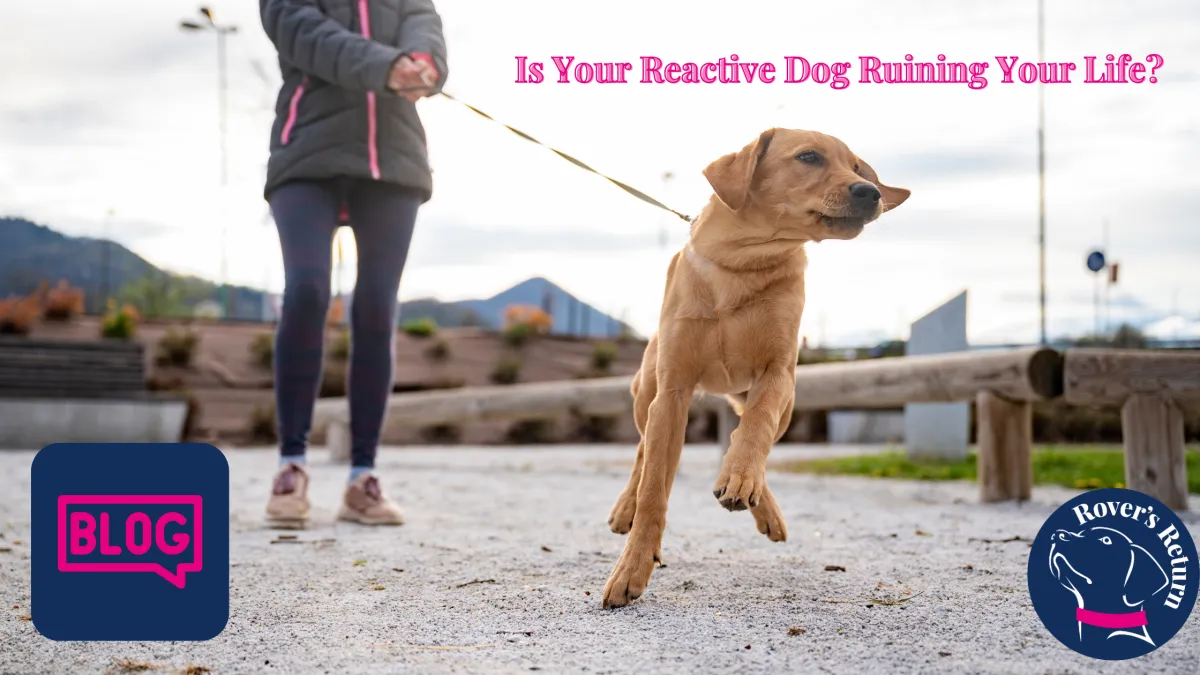Book a FREE 1:1 Assessment Call By Clicking HERE
Specialising In Dog Reactive Behaviour
Accredited by APDT, ABTC and UK DOG Behaviour and Training Charter
Qualified and Experienced
Force Free Trainer and Behaviourist
Dog Training Leicestershire Educational Blogs

Is Your Reactive Dog Ruining Your Life?
Is Your Reactive Dog Ruining Your Life?

I held my first FREE online session on decoding dog behaviour to help people understand more about why their dogs behave the way they do!
During the session, I discussed how a dog’s behaviour is formed and shaped, how it can grow into reactivity, how to understand your dog and learn from their behaviour and tips on how to manage and reduce behaviours.
Tackling dog behaviour problems is something that needs time, patience and understanding. There is no magic wand to wave, nothing that I can give you advice on or quickly help you.
You need to understand the function of the behaviour and change the need for the behaviour, not just stop the behaviour.
There are many reasons why your dog might be behaving that way.
Genetics - certain breeds are instinctively more anxious than others. The parents pass genes onto their puppies, if the mother has experienced a traumatic life, or issues during pregnancy, anxiety can be passed to the puppies
Associative learning through experiences - from early life to experiences throughout their lives will shape how your dogs' behaviour develops
Health & pain - Studies show that 80% of behaviour issues were linked to pain (mills et al. 2020) Pain will create more reactive behaviours.
Owner influence - how you as an owner treat your puppy will shape their behaviour and contribute to how your dogs behave overall - dogs that went to puppy training showed less behaviour issues as adults
Breeder influence - as early experience influence behaviour, the breeder will have an impact on your dogs' behaviour. If they have put into place great early learning experiences to boos your puppies' confidence, it could influence how they behave growing up
Diet - more information is being discovered that diet influences the way in which your dog behaves.
A million other things! - there are so many things that contribute toward your dog's behaviour.

Physiology of Behaviour Problems in Dogs
Understanding the physiological basis of behavioural problems in dogs is crucial for effectively diagnosing and treating these issues, as addressing underlying medical conditions can significantly improve a dog's behaviour.
Physiology creates reflex responses. The dog has no control over how they are reacting.
Events lead to emotions which lead to a reflex physiological behavioural response
These three negative emotions ; frustration, fear/anxiety and panic/grief.
When faced with a “trigger” or stimulus that leads to a negative emotional response, an animal will respond with avoidance/flight, fight, fool, favour or faint.
This is the fight or flight response.
In each dog, these can display very differently.
Avoidance, when on their lead isn’t possible, therefore the ‘fight’ response will likely be adopted.
A dog may try to appease the situation through their body language communication, but when this is ignored, more obvious behaviours will be required to be heard.
Fool is often misunderstood as it is seen as play, but it is very common for dogs to be ‘silly’ when they are stressed about a situation.
And let’s not forget about cortisol!
Cortisol, the primary stress hormone in dogs, significantly influences their behaviour.
Short-Term Effects of Increased Cortisol:
Increased Vigilance and Arousal
Dogs may become more alert, reactive, and easily startled.
They might exhibit heightened awareness of their surroundings, scanning for potential threats.
Fight or Flight" Response:
Cortisol triggers the body's stress response, preparing it for action.
This can manifest as increased barking, growling, pacing, or attempts to escape.
Some dogs may become aggressive, while others may exhibit avoidance behaviours.
Suppressed Appetite - this is why the dog struggles to take treats
Long-Term Effects of Chronic High Cortisol
Prolonged exposure to high cortisol levels can lead to chronic anxiety and fear-based behaviours, it will affect their behaviour overall when cortisol remains high, and they may become overly sensitive to stimuli and exhibit exaggerated fear responses causing changes in Social behaviour:**
Chronic stress can affect a dog's interactions with other dogs and people.
They might become more withdrawn, aggressive, or exhibit unpredictable behaviours more often
Learned Helplessness - dogs have been known to shut down - In situations of prolonged stress, dogs may develop "learned helplessness," where they become passive and unresponsive.
Increased Irritability - Dogs with chronically high cortisol may become more irritable and prone to snapping or growling.
Fear-based aggression can result from high cortisol levels.

What Can You Do To Help Your Dog?
Avoid punishment - when you add something bad such as a punitive tool, shouting, hitting etc when your dog reacts cortisol increases and it makes the situation worse
Use kind, effective methods to change the emotions around the behaviour, then there will be no need for the behaviour to happen! Desensitise and counter condition current responses with positive reinforcement.
Work with a professional behaviour expert such as Rovers Return
Give your dog the space that they need away from triggers - the more they react, the more the behaviour is being reinforced because the dog feels it has worked to save them
Ensure you are meeting your dog's needs - exercise, enrichment, free from pain, and a good diet
Conclusion
Changing behaviour takes time, patience and kindness. There are no magic wands.
The only effective way to effectively change your dog's reactive behaviour is to find out why they feel they need to behave that way and work with them to manage the triggers and change the emotions.
In doing this, the behaviour will become redundant
Highly Qualified Behaviourist
Accredited by APDT, ABTC and UK DOG Behaviour and Training Charter
Accredited Scentwork Instructor
Force Free Trainer and Behaviour
Force Free Trainer and Behaviour
Accredited Scentwork Instructor
Accredited by APDT, ABTC and UK DOG Behaviour and Training Charter
Highly Qualified Behaviourist
Contact Us
Sam: 07725 802995
You can contact us via Live Chat button at the bottom of the screen or the contact box to the right.
You can also book one of our services online using the View Dates buttons under the service you require.
© 2023 by Rovers Return Dog Trainers Academy - Force Free Dog Training Lutterworth, Broughton Astley, Leicestershire, Hinckley, Nuneaton, Stoney Stanton, South Kilworth, Ullesthorpe
Privacy Policy | Terms and Conditions | Terms and Conditions of Services | Sitemap

Facebook
Instagram
X
LinkedIn
Youtube
TikTok